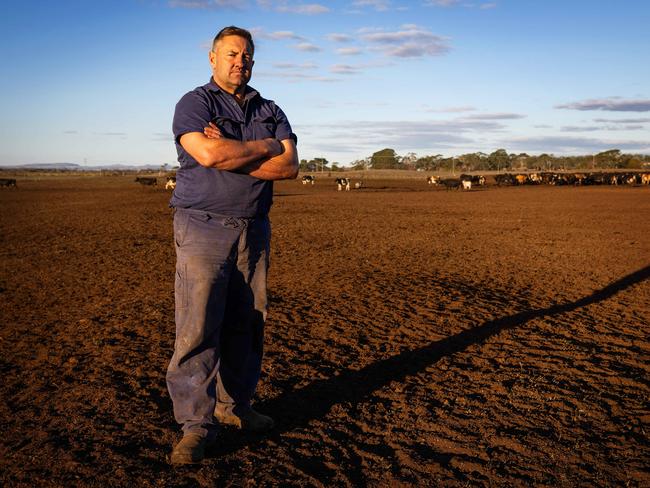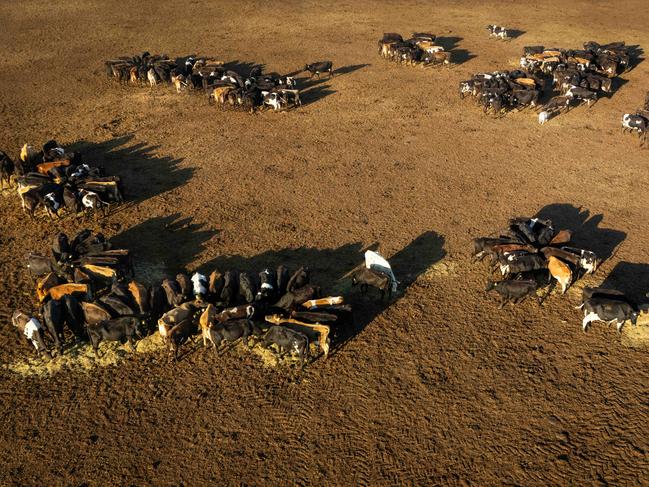Vic farmers sending dairy cows to abattoirs and beef cattle interstate for feed amid worsening drought
Drought-stricken farmers are sending tens of thousands of milking cows to slaughter and beef cattle interstate to greener pastures amid warnings the cost of dairy and meat products in Victoria are set to soar.
Victoria
Don't miss out on the headlines from Victoria. Followed categories will be added to My News.
Drought-stricken farmers are being forced to send tens of thousands of “perfectly good” milking cows to slaughter and transport similar numbers of beef cattle interstate, with warnings the cost of dairy and meat products could soar.
As hay supplies dwindle, farmers are facing huge increases in the price of bales, while many are struggling to even feed their animals.
Livestock agents say the situation is so bad that abattoirs across the state are battling to keep up with the demand to slaughter dairy cows, with thousands being culled each day and backlogs of up to three weeks.
Almost as many beef cattle are being sent to greener pastures interstate.

Furious farmers will today join firefighters in a mass rally outside state parliament, protesting against the Allan government’s expanded emergency services tax which will further hit their pockets and calling for more drought support.
With much of regional Victoria ravaged, the cost of increasingly scarce hay went up by $100 a tonne in the last week alone.
Livestock agents say the state’s four main slaughterhouses typically process 16,000 beef and dairy cattle weekly – or 3200 per day – but an unprecedented “vast majority” of those are currently dairy cows.
About 24,000 cattle were recently sold at markets in Mortlake, Shepparton, Leongatha, Barnawartha and Colac, according to industry experts.
Clarke Roycroft, a livestock agent based at Elders Camperdown, said dairy cattle were being given a “one way ticket” to the slaughterhouse.
“There’s a lot of herds being exterminated. It’s pretty ugly out here at the moment. We’re in dire straits for sure,” he said.
Farmers have warned the mass killings could see shoppers pay even more for dairy at the check-outs, amid concerns over future productivity.
And while beef cattle culls have not spiked, many animals are instead being sent up north of Victoria,
Mr Roycroft said with the huge numbers leaving Victoria, it could prompt a “severe lack of prime cattle”, also hitting meat prices.

“If you have no meat and no dairy, let’s see how things go. The vegans might be happy,” he said.
In normal circumstances, farmers would organise for their livestock to be collected by abattoirs within three or four days of calling. But now they’re being told to brace for delays of up to three weeks due to the backlog of animals already in line for slaughter, experts say.
In some cases, cattle have been turned away from saleyards already full to the brim have turned cattle away.
Pomborneit dairy farmer Ben Bennett, who is also the Australian Dairy Farmers president, said he loved his cows but had no choice but to kill them.
“That’s the heartbreaking reality of it for all farmers. I’m not Robinson Crusoe here,” he said.
“We’re between a rock and a hard place. We can’t feed them, saleyards are turning them back and the abattoirs have delays to get them in. What’s the biggest impact on a farmer’s mental health? The welfare of their cows, so let’s focus on putting some guardrails on the top of the cliff.”
United Dairy Farmers Victorian president Bernie Free, who has 600 dairy cows on his property near Warrnambool, said this was his “most difficult period” in 35 years in farming.

“Over the last three weeks, people have been making some drastic decisions on what animals
they should get rid of,” he said.
“These are good milking cows that are being killed at the end of their lactation period, but are pregnant, and would ordinarily go back to being milked within 2-3 months but the cost of keeping them alive for that period is just too much.”
The increased emergency services tax is further compounding farmers’ misery, with anticipated 189 per cent bill hikes on average, meaning some will pay tens of thousands of dollars extra.
On the day the tax passed parliament, the government announced a $15.9m boost to help farmers over winter.
But the funding package is “nowhere near enough”, farmers say.
“Jacinta Allan and Agriculture Minister Ros Spence need to get down here pronto, preferably with a cheque book in hand, and see how dire the situation is,” Mr Free said.
Western Victorian Liberal MP Bev McArthur said the drought, tax hike and increased supply costs would lead to food shortages and higher prices.
Premier Jacinta Allan on Sunday said the government was monitoring conditions, adding: “If we need to provide more support, we will do so.”
South West Coast MP Roma Britnell, who represents the drought impacted Warrnambool, said farmers are desperate.
“In all my 25 years of farming, I have never seen it this dry — a failed spring followed by a failed autumn has left us in a dire situation,” she said.
“With no rain on the horizon and a harsh winter approaching, there’s no chance of pasture growth until spring.”




